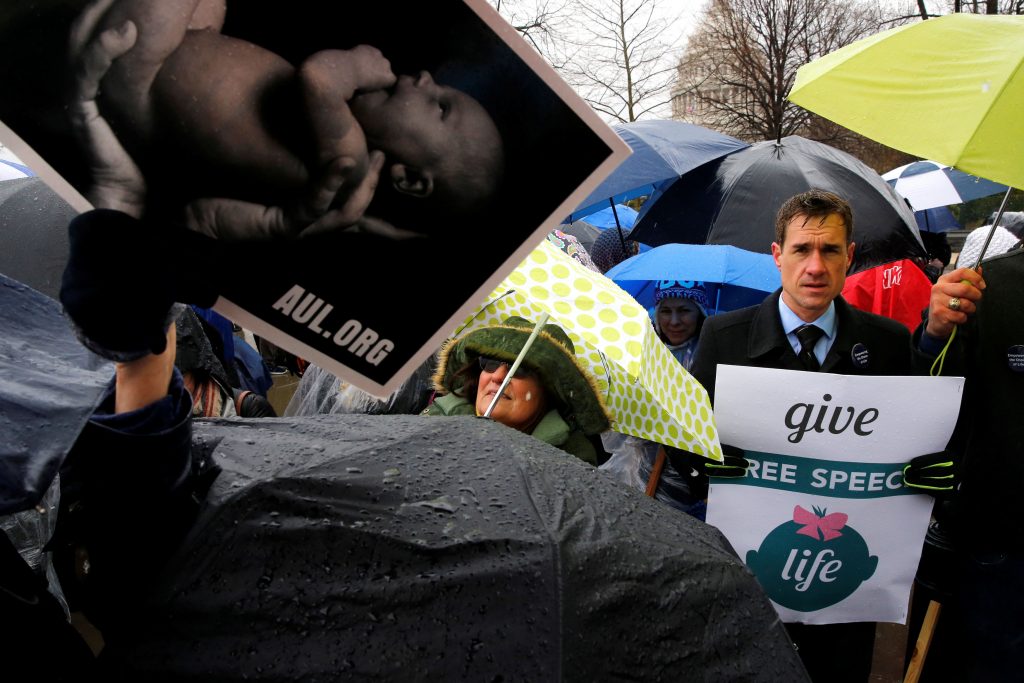In his much discussedrnindictment of secularized liberal democracy, Polish philosopher and sometimerngovernment minister Ryszard Legutko writes bitingly of the powerful andrncoercive “demon” he so abhors.
Toward the end of “The Demon in Democracy” (Encounter Books), he describes the problemrnlike this: “The law has become a sword against the unresponsiveness andrnsometimes resistance of society to the policy of aggressive socialrnrestructuring that is euphemistically called modernization.”
Legutko writes as arnconservative intellectual who, having lived under communism, has had it up tornhere with social engineering as practiced by that super-nanny called thernEuropean Union.
And in America? Two casesrnwhich the Supreme Court will decide sometime between now and the start ofrnsummer reflect the same dynamic at work here.
The cases come from tworndifferent states, California and Colorado, involve two different social issues —rnabortion and same-sex marriage — and have two very different sets of facts. Butrnboth raise the same free speech question: How far can the state legitimately gornin forcing individuals and groups to communicate messages that support things theyrnreject in conscience?
In the Colorado case (MasterpiecernCakeshop v. Civil Rights Commission), the state supreme court upheld the civilrnrights panel’s finding that a Lakewood, Colorado baker named Jack Phillips, anrnevangelical Christian who opposes same-sex marriage on conscience grounds, violatedrnanti-discrimination law by declining to bake a wedding cake for a same-sexrncouple.
Phillips says baking cakesrnis a form of self-expression for him, and compelling him to provide a weddingrncake in these circumstances would be compelling him to lend support to somethingrnhis conscience tells him is wrong.
The U.S. Supreme Courtrnheard oral arguments in this case last December, and its decision could come atrnany time. It will be interesting to see whether the court chooses to link it tornthe California case (National Institute of Family and Life Advocates v. Becerra),rnwhich was argued March 20.
The dispute here concernsrna California law requiring licensed pro-life pregnancy counseling centers to postrnnotices advising clients of the availability of free abortion elsewhere, andrnunlicensed centers to give prominence to the fact that they aren’t medicalrnfacilities.
Other courts have overturnedrnlaws like this, but a panel of the 9th Circuit U.S. Court of Appealsrnupheld California’s version. Thus the pregnancy counseling centers, most ofrnthem religiously sponsored, face having to communicate messages intended (byrnthe state legislature, that is) to lend support to abortion providers.
This is what Legutko describesrnin his book: “The state representatives, armed with the rhetoric ofrnantidiscrimination, felt it was their duty to regulate matters that for toornlong had remained unregulated, which often meant giving privileges to certainrngroups and taking them away from others.”
The U.S. Conference ofrnCatholic Bishops is one of many groups that filed amicus curiae briefs in bothrnof these cases. The USCCB brief in the California case underlines the fact thatrnreligious groups — and, one might add, individuals — are not infrequentlyrncalled by conscience to embrace positions of a “countercultural” nature whenrnmeasured against prevailing secularrnvalues. The First Amendment requires that the government respect this right,rnnot seek to undermine it.
Legutko speaks of arn“crusade against Christianity” in Europe, where aggressive secularists “continuernto make new conquests and to colonize more and more areas of human life.” Whatrnthe Supreme Court says about these cases from California and Colorado will dornmuch to determine the future of similar efforts on this side of the Atlantic.

